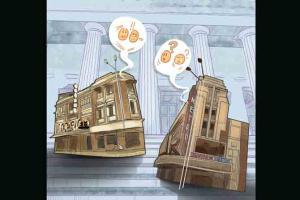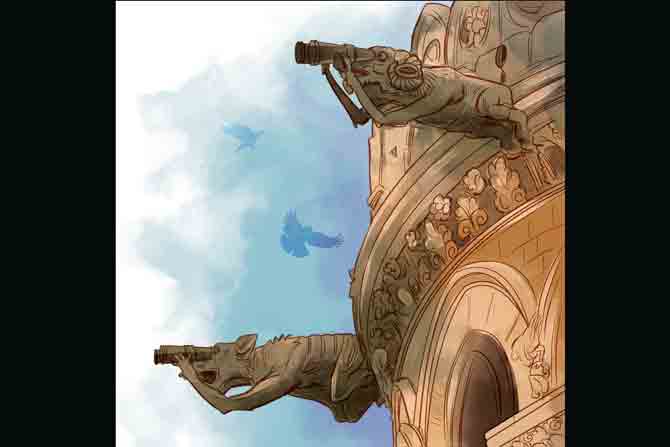As the lockdown keeps Mumbai's crowds at home, the city's landmarks use the silence to let themselves be heard

Illustration/ Uday Mohite
 Making waves
Making waves
Who would be the oldest presence here, having seen it all—city history, mystery and chemistry? Hugging the Colaba harbour tip, I'm a wave lapping the Radio Club promontory for as long as water has swirled around Old Woman's Island. In these dark hours of fearmongering, fake news and alarming agenda on social media, let me describe how honest communication was transmitted a century ago. Five years before the Bombay Presidency Radio Club opened, it aired the country's first broadcast from a low-powered station, operating on 387-metre wavelength in June 1923. The only station till All India Radio in 1927 (then called Indian Broadcasting Company), in the decades headed to freedom, its news bulletins stirred listeners, making patriots of people, healing hearts and minds.
ADVERTISEMENT
Plague protector, forgotten hero
A city beautiful enough to be hailed Urbs Prima in Indis is resigned to being scarred by the pockmarks of ugly street furniture. Mea culpa, I am a railing of thoroughly unimaginative spikes, designed to girdle the Dhobi Talao statue of a forgotten hero. Dr Acacio Gabriel Viegas is the man of the moment. The first Goan elected to the BMC in 1888, he detected Bombay's 1896 bubonic plague with his patient Lukmibai's case. At tremendously grave risk to himself, he inoculated 18,000 against the dreaded disease, while campaigning to clean narrow alleys infested by rats, which he discovered were carriers of the fatal illness. On the nearby street off Kalbadevi Road named for Dr Viegas, 200 parishioners at the little Church of Our Lady of Health pray fervently for universal wellbeing this Easter Sunday.
Gothic grand misses madness
What a vantage position I peer down from. A gargoyle in Gothic splendour on the monumental terraces of Victoria Terminus, FW Stevens' creation to commemorate Queen Victoria's reigning golden jubilee year in June 1887. The platforms of India's busiest railway station last saw this kind of desertion 12 years ago when passengers fell to terrorist bullets. I long for the milling and spilling of in-out millions again, the daily insanity of noisy overcrowding. The serene Lady of Progress on top of Bombay's first domed structure is savouring the solitude. Not as prepared to welcome back the hurried, harried hordes. Thank heavens you got sculpted at this height, she tells me. Face masks off, they'll start squirting spit around as usual.
When the show can't go on
We're the shuttered cinema halls of Grant Road. Did you just moan, "Us too!" Too bad, take that, miserable multiplexes. Gloating when your glitz sent us into oblivion, snivel away now. Anyway, Netflix or not, your doors will open at some point. Unlike us, curtains closed forever, forced into slow death.
Our proud row witnessed momentous occasions. I recall an incident at Imperial theatre, when Jawaani Ki Hawa released in September 1935, sparking controversy unrelated to its suggestive title. Franz Osten's romantic thriller had haunting music scored by Saraswati Devi (Khurshid Minocherhomji from a conservative clan) and her sister Chandraprabha (Manek) as the second heroine with Devika Rani. Demonstrating at the Imperial, the orthodox Parsee Federal Council sought a ban—a fate the film escaped thanks to its producer Bombay Talkies' clout.
Our single-screen SoBo cousins taught us posh talk (like reeling off that Britain's Odeon cinema chain is compacted from its founder's publicity line, "Oscar Deutsche Entertains Our Nation"). The Regal and Liberty survive on the goodwill of patrons. And Metro's mismatching rejigged avatar must surely cause its original architects Ditchburn, Mistri & Bhedwar to turn in their graves in consternation.
Who you calling pigeon-brained?
Aflutter returning to roost every evening, I'm a pigeon perched in the pagdi folds of the Byculla statue of the Khada Parsi. He is Cursetjee Manockjee, the philanthropist who introduced Indian girls to an English education in 1859, schooling them from his home, Villa Byculla. Built in tribute by his son, this rare cast-iron structure soars 40 feet sky-high on a Corinthian column with four mermaids blowing water conches at its base.

Illustration/ Uday Mohite
With a clearer coo (thanks for the break, polluting traffic fumes) I repeat what naturalists confirm: enjoy the forwards showing flora and fauna, supposed to suddenly surface anew during lockdown. But peacocks, dolphins, the feathered friends I share the air with like hornbills and magpie robins… are more often around than people have been able to appreciate. Hard to hear sweet birdsong above honking. Easier to spot smiling dolphins lay claim ashore with Arabian Sea tides not spewing garbage on Marine Drive. Hedges have rustled heavy with mussaenda and bougainvillea blooms every glorious summer. Care to stop and stare a bit closer after "normal"
life resumes?
Fishing boat blues
We know those giant cranes with menacing hooks will scoop away fishermen's livelihood along with the Coastal Road debris. Now comes fresh despair, making me bob agitatedly, anchored alongside other desolate boats. Outrageous how Worli Koliwada residents are trolled and traumatised, accused of converting their 80,000-strong basti into Coronawada. Squashed 10 in a tiny room, consigned to common stinky loos, what distancing can families like my owners possibly be expected to keep? Suspected, segregated and sealed, they have nowhere to turn except into the lathis of cops. To think that Colaba to Cavel, Dadar to Danda, their Koli forefathers were among the city's earliest settlers.
A drumbeat further afield
I snuggle with other essentials packed in the suitcase, a favoured object like any Sidi musical instrument. The dockyard worker I belong to lives near the Dongri dargah. He's getting us (me and misra, the rattle accompanying my drumbeat) ready to board the first train we hope will soon chug to our native Gujarat. I am African, like his 11th-century ancestors who landed in western India. Today, some feel they'll eat more affordably back home. But, neither the home state nor this city of dreams-turned nightmare seems to want our community anymore.
Quiet under the over
Pillars support. I'm one that also shelters. Constructed in 1964 as a leg for the city's first flyover, at Kemp's Corner, I'm often makeshift home to ragpickers and urchin children. Rounded up in the lockdown, I miss those thin kids who'd press against me as I regaled them with my story. Situated between Cumballa and Malabar hills, the bridge owes its arching aesthetic to structural engineer Shirish Patel. To inaugurate the civil engineering marvel, the motorcade of Pope Paul VI, first Pontiff to visit the country, got an excited gathered public genuflecting collectively. Later motorcades glided past, carrying the Shah of Iran, Coretta Scott King and English royals, including some struck by COVID-19 back in their fortified castles. A democratic virus, this.
No caving in
I rejoice at the respite. A brief reprieve from loafers gouging graffiti on me, scratching nonsense like "Sumeet loves Shaila" to deface my cool stone. Carved from basalt rock in the Borivli National Park forest, I'm the mane of a lion on Buddha's throne on a stupa at Kanheri Caves. An inscription refers to these as Krishnagiri Maharaja Mahavihara, "the king of great monasteries". Across 35 square miles, this park is the world's largest located within city limits, a wonderful distinction. I wait for the day visitors accord such sites the respect they deserve.
Sorry, want leg on chair
This social curfew is all very well and, God knows, vital too. Still. The silence deafens. Even the wall clock's stopped chiming without its weekly wind-up. Tough to be part of the furniture in a busy Irani restaurant that's closed. Not permanently, I'm thankful. As the oldest bentwood chair—of Czech origin, no less—warmed by hundreds in a midtown cafe, I hope the doors remain bolted temporarily. If already shaky business gets worse, the five feuding partner bosses could sell. Ah, what I'd give for the place to just stay alive on reopening.
Customers have sunk into my simple contours for a lifetime. I've been privy to stolen hugs, whispering couples, warm confidences, loud quarrels, lonely lives recharged brightly, comfortingly for a while. They've fed me as well, endearing old gentlemen slopping drops of gormasabzi and gameh gravy on my seat. Instead, my diet is stale khari biscuit crumbs a pair of mice leave behind at night. "Sorry, no leg on chair" reads a chalk-scrawled instruction on a slate beside the cash counter. Even that wouldn't bother me now. How curfew leaves you craving company, though I
used to moan about needing more space. Un-lockdown, where are you?
Author-publisher Meher Marfatia writes fortnightly on everything that makes her love Mumbai and adore Bombay. Reach her at meher.marfatia@miday.com/www.mehermarfatia.com
Catch up on all the latest Mumbai news, crime news, current affairs, and a complete guide from food to things to do and events across Mumbai. Also download the new mid-day Android and iOS apps to get latest updates.
Mid-Day is now on Telegram. Click here to join our channel (@middayinfomedialtd) and stay updated with the latest news
 Subscribe today by clicking the link and stay updated with the latest news!" Click here!
Subscribe today by clicking the link and stay updated with the latest news!" Click here!







